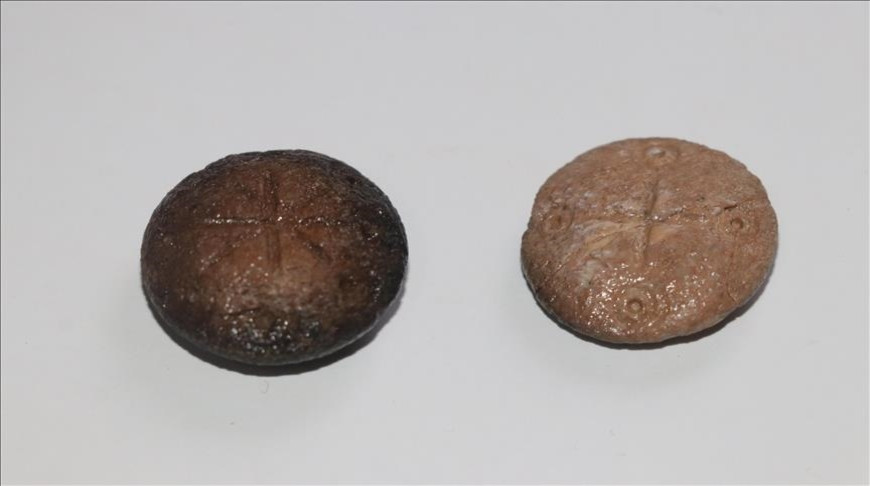
KARABUK, 11 January (BelTA - Aadolu) - Excavations at the Hadrianopolis
ancient city in the northern province of Karabuk in Türkiye have
uncovered two bone game pieces.
Efforts led by Ersin Celikbas from the archaeology department at Karabuk University, are ongoing in the ancient city which was occupied during the late Chalcolithic, Roman, and early Byzantine periods.
Mosaics depicting animals were found on the floors of all uncovered structures, earning the ancient city the nickname "Zeugma of the Black Sea."
So far, excavations have uncovered structures, including baths, churches, tombs, an inner castle, a fountain, city walls, a villa, and religious sites.
Recently uncovered were bone game pieces believed to belong to a 5th-century military strategy game.
Findings 'clearly support' presence of a Roman headquarters
Celikbas told Anadolu that important discoveries have been made during excavations under the Heritage for Future project of the Turkish Culture and Tourism Ministry.
He said his project recently found two game pieces. "These bone objects are lentil-shaped and disk-shaped. One stone has a four-armed symbol, while the other has an eight-armed symbol. These symbols actually indicate that the stones could be game pieces," he said.
The archeologist explained that games were played with bone pieces.
"The discovery of strategy games in Hadrianopolis further solidifies the presence of a military unit here, as it is known that bone pieces were used to play ancient strategy games such as Ludus Latrunculi and Doudecim Scripta," he said.
Celikbas noted that strategy games were common in ancient Anatolian cities, and enjoyed by soldiers, and their discovery supports the idea of a long-standing military presence in Hadrianopolis.
"The presence of a Roman headquarters and a Roman unit in Hadrianopolis from the 2nd to the 5th century AD, as well as the existence of the Roman Fortress, are clearly supported by these findings," the archeologist underlined.
Emphasizing that some of the game pieces once enjoyed in ancient times have survived to the present day, he said, "These were games based on military strategy. Today, we still see military strategy games being frequently played. Some of these are well-known games like checkers, Battleship and the digital game, Minesweeper.”
He added that the work continues, and his team expects to uncover more significant discoveries in 2025.
Efforts led by Ersin Celikbas from the archaeology department at Karabuk University, are ongoing in the ancient city which was occupied during the late Chalcolithic, Roman, and early Byzantine periods.
Mosaics depicting animals were found on the floors of all uncovered structures, earning the ancient city the nickname "Zeugma of the Black Sea."
So far, excavations have uncovered structures, including baths, churches, tombs, an inner castle, a fountain, city walls, a villa, and religious sites.
Recently uncovered were bone game pieces believed to belong to a 5th-century military strategy game.
Findings 'clearly support' presence of a Roman headquarters
Celikbas told Anadolu that important discoveries have been made during excavations under the Heritage for Future project of the Turkish Culture and Tourism Ministry.
He said his project recently found two game pieces. "These bone objects are lentil-shaped and disk-shaped. One stone has a four-armed symbol, while the other has an eight-armed symbol. These symbols actually indicate that the stones could be game pieces," he said.
The archeologist explained that games were played with bone pieces.
"The discovery of strategy games in Hadrianopolis further solidifies the presence of a military unit here, as it is known that bone pieces were used to play ancient strategy games such as Ludus Latrunculi and Doudecim Scripta," he said.
Celikbas noted that strategy games were common in ancient Anatolian cities, and enjoyed by soldiers, and their discovery supports the idea of a long-standing military presence in Hadrianopolis.
"The presence of a Roman headquarters and a Roman unit in Hadrianopolis from the 2nd to the 5th century AD, as well as the existence of the Roman Fortress, are clearly supported by these findings," the archeologist underlined.
Emphasizing that some of the game pieces once enjoyed in ancient times have survived to the present day, he said, "These were games based on military strategy. Today, we still see military strategy games being frequently played. Some of these are well-known games like checkers, Battleship and the digital game, Minesweeper.”
He added that the work continues, and his team expects to uncover more significant discoveries in 2025.













